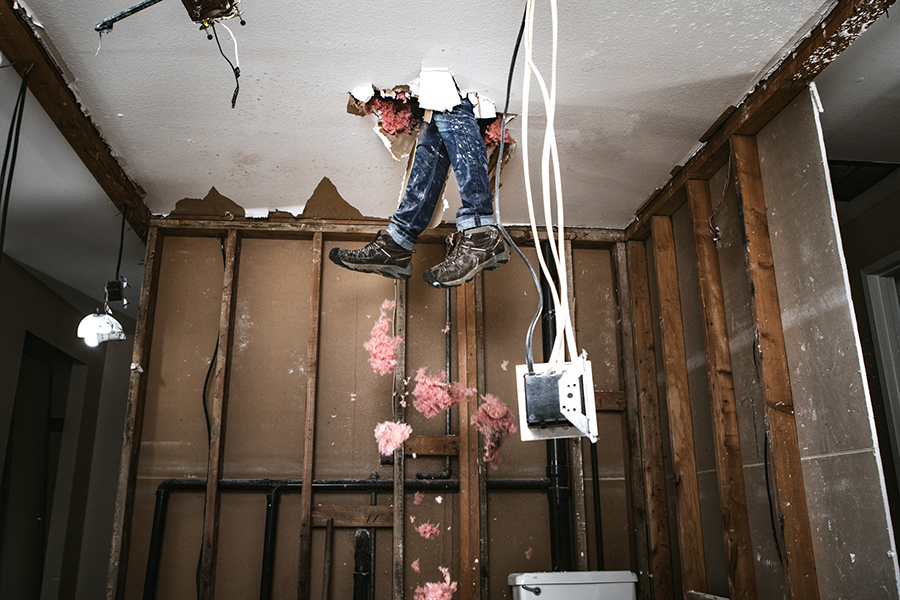Thinking of Skipping a Home Inspection? Think Again
What you need to know before taking this drastic step to improve that offer on a new home.

Photo via Getty Images/ RyanJLane
Seasoned realtors and home owners know a home inspection contingency can make or break a deal. Having one written into an offer can not only save buyers time, money, and frustration, but prevent them from purchasing a space that could literally be on the edge of collapse.
When buyers have an inspection contingency, they can negotiate or back out of their offer if the inspector finds something really wrong with the property, as long as the inspection is done within the timeframe specified in the offer. But with a market as competitive as today’s is, many buyers are going to extreme lengths to secure the home of their dreams, including waiving an inspection contingency and signing up to buy a house without knowing what lies beneath. If you do this, any repairs needed, from a broken dishwasher to new plumbing, are totally on you.
While the notion of gambling on a house like this was once unthinkable, realtors say more and more people are willing to take this chance. With sellers getting dozens of offers, every bit of advantage helps. What seller would risk losing out on a good offer just because something was wrong with the house? And if the house looks good, why not go for it?
If this prospect sounds tempting, here’s what you need to know about potentially waiving an inspection.
No realtor worth their salt is going to recommend it
“I would never waive it,” says Samantha Eisenberg, a Compass real estate broker who works in the Boston suburbs. “A home purchase is probably the biggest purchase of your entire life and we spend more time picking out a sweater…If I buy clothes online, I try it on and see how it looks. A house we go through in 30 minutes and you’re waiving inspections (over) something that costs over a million dollars.”
A full home inspection can unearth everything from structural issues, roof problems, or faulty electricity and plumbing. If the thought of dealing with any of these gives you a major headache, you’re better off following the recommendation of your realtor.
It may win you a house, but it’ll cost you negotiating power
Eisenberg once had a client buying an old Victorian home with a beautiful, detailed staircase. But what looked glamorous was a hazard: an inspector found the stairs were sagging and were at risk of collapse. The buyer had an inspection contingency in their offer and was able to renegotiate the selling price down $50,000 to accommodate the cost of replacing the stairs.
Similarly, the inspection contingency can also give you the option to back out of a deal. Eisenberg says she once had a client purchasing an older home that had a huge foundational issue found during an inspection. The inspector said the home was at risk of crumbling entirely, so the clients walked. If you waive your inspection contingency, you won’t have that option…and could be facing a crumbling foundation beneath your new dream home.
It can mess with your finances for years to come
Let’s say you waive your inspection, move in, and find out there’s a crack in your boiler and it needs replacing. Except you’ve already put most of your money towards buying the house. So, you put the cost of the replacement on your credit card and then another repair comes up…and before you know it, you’re bogged down by not only your mortgage, but debt from home repairs.
“Buying your first home can set you up financially or bury you if you make mistakes,” says Tom Matthews of the Tom and Joanne Team with Gibson|Sotheby’s International Realty, who works in the greater Boston area. “For most homeowners, the equity they have in their home is in the top five of their financial profile. People should not get caught up in mania. They should be responsible with their money.”
If you’re set on waiving an inspection, Matthews says it should be on a purchase that will leave you with funds after closing should something major come up. In other words, don’t spend every last penny of your savings on the house itself.
There are ways around waiving a contingency without losing a home
Many sellers are trying to avoid accepting an offer if it means they could lose money based on negotiations after an inspection. But there’s ways to appease both parties. Matthews says area buyers can agree to pay up to a certain amount in repairs when making their offer. This lets the seller know the offer is serious, but gives the buyer a proper inspection and an out if the repairs cost too much.
Leslie Pappas, a real estate agent with Coldwell Banker serving Beverly and the surrounding areas, says some buyers also opt for an informational inspection. In those cases, a full inspection will occur, and the buyer has the option to walk away based on the results, but they can’t re-negotiate the offer for the costs of repairs.
A “mini inspection” is not a full home inspection…but it still may be worthwhile
With clients set on waiving inspection contingencies, Pappas is advising them to instead do a “mini inspection” or a “pre-inspection” prior to submitting an offer. Many brokers will allow about an hour to walk through with an inspector before or after an open house (though don’t attempt to do one during an open house without the seller’s blessing, or else you’ll risk getting kicked out).
“There’s risk involved in that as you have to pay [the inspector] several hundred and there’s no guarantee offer accepted,” she says. “But you’re in a better position.”
But this is not a full inspection. Safety hazards like radon, asbestos, vermiculite, and knob and tube wiring aren’t going to be discovered in a brief walkthrough.
“It’s kind of ridiculous for clients to assume in 20 minutes or an hour, a home inspector can do an inspection,” says Jason Sobol, a certified inspector and the owner of Pheasant Hill Home Inspections in Framingham. “What we fear is based on that one hour, they buy the house, they move into the house, and they find something that wasn’t discovered during that one-hour walkthrough.”
Even if you want to skip an inspection pre-purchase, you’re still going to need one eventually
Buyers are missing more than what repairs are needed to their home when they waive an inspection. They’re missing out on learning how their home ticks. Sobol recommends doing a post-purchase inspection just to know what you’re getting into even if the offer is signed. And don’t give into the temptation to turn a blind eye to what might need to be repaired. Sobol said he’s done home inspections where he’s found pipes wrapped in asbestos insulation and poisonous gases leaking into attics.
“If you want to waive the home inspection, that’s up to you,” he says. “But as soon as you close, do it just for information purposes. Then you’re protected.”


